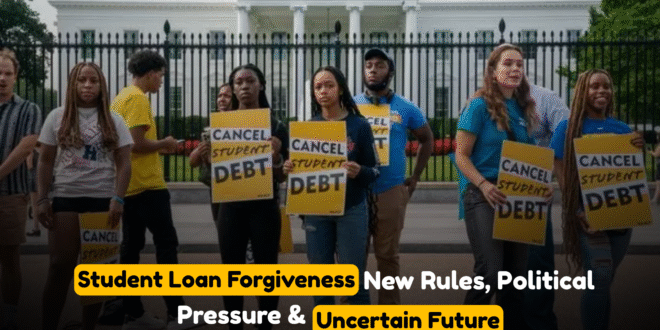1. Trump-Era Changes Could Threaten Loan Forgiveness for Public Workers
In the past 24 hours, the U.S. Department of Education under former President Donald Trump’s influence has drafted a proposal that could significantly alter the Public Service Student Loan Forgiveness (PSLF) program. According to recent reports, this new policy would allow the government to exclude entire organizations from PSLF eligibility if they are believed to be engaged in activities https://thebarchart.com/james-gunn-responds-to-box-office-expectations-for-superman-review/deemed “illegal” by the administration.
Critics fear this move could be politically motivated and used as a tool to punish nonprofit groups that support causes like immigration rights, LGBTQ+ youth, and public health. Many view the proposal as vague and dangerously open to interpretation.
2. Payment Tracking System Temporarily Halted
Adding to borrowers’ frustration, a major federal loan servicer recently notified users that the tracking system for forgiveness payments has been paused. This means borrowers can no longer monitor whether their monthly payments are qualifying toward the 120-payment forgiveness milestone.
This has caused confusion and concern, especially for borrowers who are close to completing their 10-year public service commitment. The halt in tracking could lead to missed records and further delays in the forgiveness process.
3. Timeline and Next Steps for Rule Implementation
The proposed changes are currently in the public comment phase and, if finalized, may go into effect by mid-2026. However, the lack of a clear definition for what constitutes an “illegal activity” creates a gray area.
Organizations and employees alike are now uncertain whether their service will continue to qualify for forgiveness under this evolving rule. Legal experts predict lawsuits could follow if the rule is enforced based on political or ideological lines.
4. Potential Impact on Public Sector and Nonprofits
This proposal could severely affect staffing and morale in essential public services such as education, nursing, public defense, and emergency services. Many workers have relied on PSLF as an incentive to remain in low-paying, high-impact jobs.
If nonprofit organizations and public employers are disqualified from the program, thousands of professionals could lose their eligibility, despite years of service and payment history.
FAQs
Q1: What is the PSLF program?
The Public Service Loan Forgiveness (PSLF) program forgives federal student loans after 120 qualifying monthly payments while working full-time for a government or qualifying nonprofit employer.
Q2: What change is being proposed?
The Education Department may gain authority to disqualify entire organizations from PSLF if they are accused of engaging in illegal or controversial activities, even without a court ruling.
Q3: Does this affect current borrowers?
Yes. The pause in payment tracking and unclear employer eligibility directly impact borrowers who are already counting their PSLF payments.
Q4: When could this new rule take effect?
If finalized, the rule could be implemented as early as mid-2026 after the public comment period ends.
Q5: What should borrowers do now?
Borrowers should continue making payments, document their employment, and stay updated through official channels. Participating in the public comment process may also help shape the final rule.




